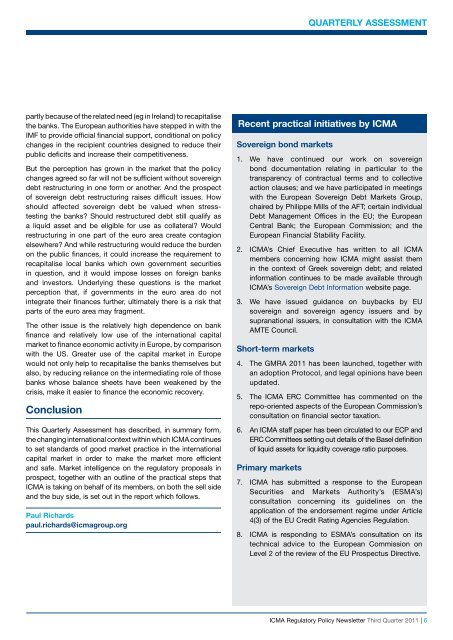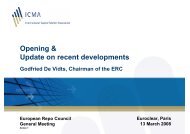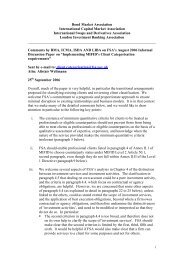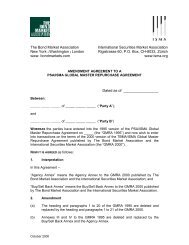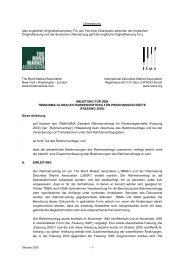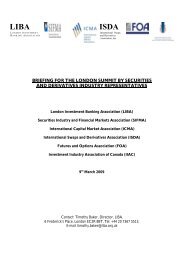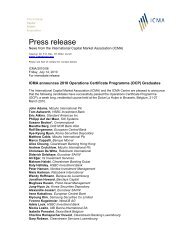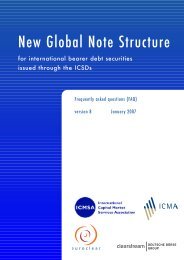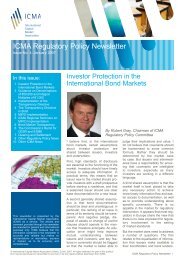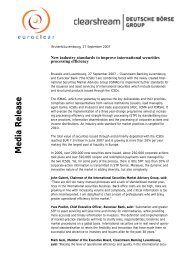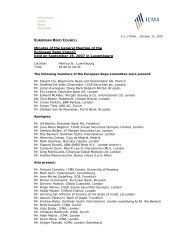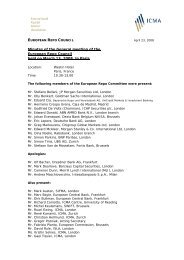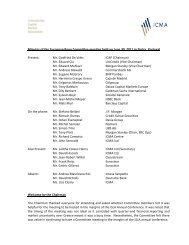Issue no. 22: ICMA Regulatory Policy Newsletter
Issue no. 22: ICMA Regulatory Policy Newsletter
Issue no. 22: ICMA Regulatory Policy Newsletter
Create successful ePaper yourself
Turn your PDF publications into a flip-book with our unique Google optimized e-Paper software.
partly because of the related need (eg in Ireland) to recapitalise<br />
the banks. The European authorities have stepped in with the<br />
IMF to provide official financial support, conditional on policy<br />
changes in the recipient countries designed to reduce their<br />
public deficits and increase their competitiveness.<br />
But the perception has grown in the market that the policy<br />
changes agreed so far will <strong>no</strong>t be sufficient without sovereign<br />
debt restructuring in one form or a<strong>no</strong>ther. And the prospect<br />
of sovereign debt restructuring raises difficult issues. How<br />
should affected sovereign debt be valued when stresstesting<br />
the banks? Should restructured debt still qualify as<br />
a liquid asset and be eligible for use as collateral? Would<br />
restructuring in one part of the euro area create contagion<br />
elsewhere? And while restructuring would reduce the burden<br />
on the public finances, it could increase the requirement to<br />
recapitalise local banks which own government securities<br />
in question, and it would impose losses on foreign banks<br />
and investors. Underlying these questions is the market<br />
perception that, if governments in the euro area do <strong>no</strong>t<br />
integrate their finances further, ultimately there is a risk that<br />
parts of the euro area may fragment.<br />
The other issue is the relatively high dependence on bank<br />
finance and relatively low use of the international capital<br />
market to finance eco<strong>no</strong>mic activity in Europe, by comparison<br />
with the US. Greater use of the capital market in Europe<br />
would <strong>no</strong>t only help to recapitalise the banks themselves but<br />
also, by reducing reliance on the intermediating role of those<br />
banks whose balance sheets have been weakened by the<br />
crisis, make it easier to finance the eco<strong>no</strong>mic recovery.<br />
Conclusion<br />
This Quarterly Assessment has described, in summary form,<br />
the changing international context within which <strong>ICMA</strong> continues<br />
to set standards of good market practice in the international<br />
capital market in order to make the market more efficient<br />
and safe. Market intelligence on the regulatory proposals in<br />
prospect, together with an outline of the practical steps that<br />
<strong>ICMA</strong> is taking on behalf of its members, on both the sell side<br />
and the buy side, is set out in the report which follows.<br />
Paul Richards<br />
paul.richards@icmagroup.org<br />
QUARTERLY ASSESSMENT<br />
Recent practical initiatives by <strong>ICMA</strong><br />
Sovereign bond markets<br />
1.<br />
2.<br />
3.<br />
We have continued our work on sovereign<br />
bond documentation relating in particular to the<br />
transparency of contractual terms and to collective<br />
action clauses; and we have participated in meetings<br />
with the European Sovereign Debt Markets Group,<br />
chaired by Philippe Mills of the AFT; certain individual<br />
Debt Management Offices in the EU; the European<br />
Central Bank; the European Commission; and the<br />
European Financial Stability Facility.<br />
<strong>ICMA</strong>’s Chief Executive has written to all <strong>ICMA</strong><br />
members concerning how <strong>ICMA</strong> might assist them<br />
in the context of Greek sovereign debt; and related<br />
information continues to be made available through<br />
<strong>ICMA</strong>’s Sovereign Debt Information website page.<br />
We have issued guidance on buybacks by EU<br />
sovereign and sovereign agency issuers and by<br />
supranational issuers, in consultation with the <strong>ICMA</strong><br />
AMTE Council.<br />
Short-term markets<br />
4.<br />
5.<br />
6.<br />
The GMRA 2011 has been launched, together with<br />
an adoption Protocol, and legal opinions have been<br />
updated.<br />
The <strong>ICMA</strong> ERC Committee has commented on the<br />
repo-oriented aspects of the European Commission’s<br />
consultation on financial sector taxation.<br />
An <strong>ICMA</strong> staff paper has been circulated to our ECP and<br />
ERC Committees setting out details of the Basel definition<br />
of liquid assets for liquidity coverage ratio purposes.<br />
Primary markets<br />
7.<br />
8.<br />
<strong>ICMA</strong> has submitted a response to the European<br />
Securities and Markets Authority’s (ESMA’s)<br />
consultation concerning its guidelines on the<br />
application of the endorsement regime under Article<br />
4(3) of the EU Credit Rating Agencies Regulation.<br />
<strong>ICMA</strong> is responding to ESMA’s consultation on its<br />
technical advice to the European Commission on<br />
Level 2 of the review of the EU Prospectus Directive.<br />
<strong>ICMA</strong> <strong>Regulatory</strong> <strong>Policy</strong> <strong>Newsletter</strong> Third Quarter 2011 | 6


